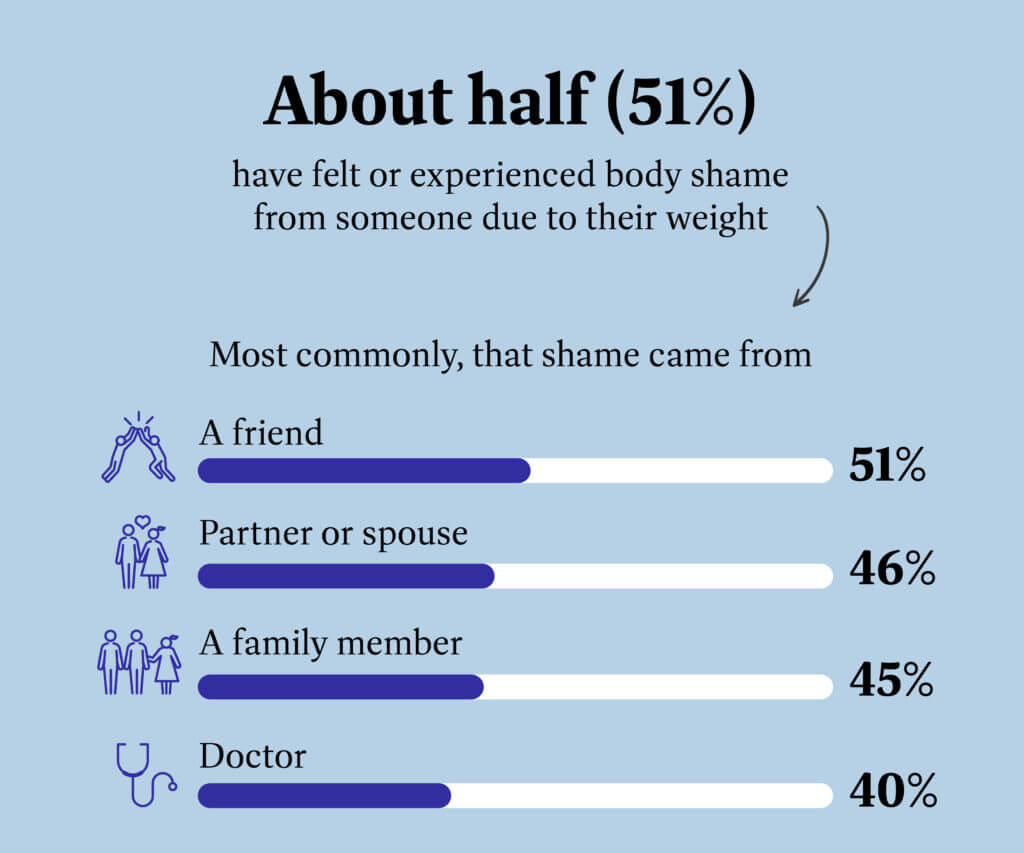NEW YORK — Almost four in five Americans (78%) say it is possible to love your body and still want to lose weight, according to a new survey of 2,000 respondents. Despite this, about half (51%) also feel they’ve experienced body shame due to their weight, most commonly from a friend (51%), partner or spouse (46%), family member (45%), or doctor (40%).
Respondents also reveal that they’ve felt as if they have no willpower (60%), that it’s their fault (55%), and that they’re lazy (52%) as a result of body shaming. Thus, it’s not surprising that 65 percent are willing to try anything to lose weight, no matter how restrictive or unreasonable the approach might sound.
Conducted by OnePoll on behalf of WeightWatchers, the survey explored Americans’ mindsets when looking to lose weight, including how culture, society, and one’s environment might impact their frame of mind. While having a community of like-minded people (77%) and accountability (73%) was important for many respondents, some also felt hesitant to share their weight loss journey with others. In fact, more than half (56%) consider their journey a personal experience they want to keep private, and 45 percent avoid sharing so as not to be shamed for wanting to lose weight.
“Weight-based stigma is pervasive and pernicious in our society. This stigmatization and shaming is cruel and harmful. It leads people to engage in unhealthy behaviors and has lasting effects on how people view themselves — neither of which are helpful for a successful weight loss journey,” says Gary Foster, PhD, author of “The Shift: 7 Powerful Mindset Changes for Lasting Weight Loss” and Chief Scientific Officer at WeightWatchers, in a statement. “It’s crucial to view the journey as something you’re doing for yourself and not against yourself.”

Losing weight is all in the mind
For two in three respondents (69%), minimizing the risk of other health issues associated with weight gain is their top motivator for losing weight. That’s followed by self-esteem and confidence (65%) and looking and feeling their best (62%).
The survey also took a larger look at how Americans think about themselves and their weight loss journey. While exercise and diet top the list as two essential factors, 85 percent agree that your mindset is also important when you’re looking to lose weight. Almost two-thirds (63%) believe they’re more likely to focus on what’s not going well than what is.
Even so, when facing a setback on a weight loss journey, 75 percent are more likely to speak negatively to themselves than they would to a friend. While almost two-thirds (65%) expect setbacks to happen on a regular basis, 76 percent agree that once they hit an obstacle, they feel discouraged and feel like giving up. Others have lost focus because of too much happening in their lives (55%), a regimen being too restrictive (53%), or not having a community or support system (41%).
“While eating and activity are important for weight loss, your mindset is what matters most and drives long-term success,” Dr. Foster adds. “Treating yourself with kindness, particularly when navigating setbacks, is critical to making the weight loss journey positive, not punitive. Self-compassion beats self-criticism every single time.”
Survey methodology:
This random double-opt-in survey of 2,000 Americans who are looking to lose weight was commissioned by Weightwatchers (WW) between August 26 and September 1, 2022. It was conducted by market research company OnePoll, whose team members are members of the Market Research Society and have corporate membership to the American Association for Public Opinion Research (AAPOR) and the European Society for Opinion and Marketing Research (ESOMAR).
